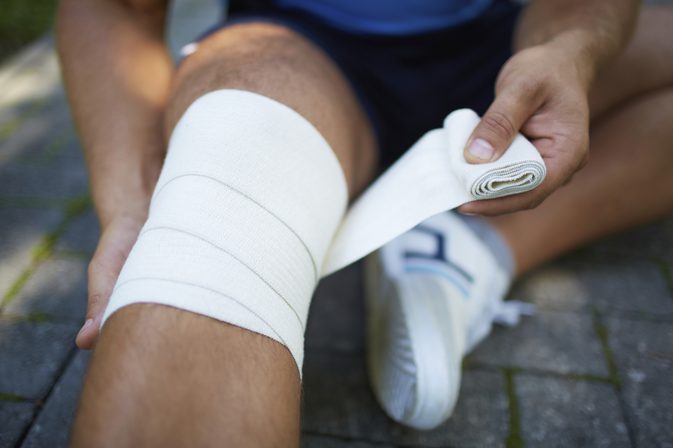There are many reasons causing swelling such as pregnancy, injury, or other medical conditions. Swelling is the way your body responds to minor trauma. This problem can become frustrating and even painful. There are some effective methods to reduce minor injury-related swelling as drinking plenty of fluids or applying something cool to the swollen area. Read on to learn more about 3 ways to reduce swelling for minor injuries.

1.Using the R.I.C.E method
Rest the swollen area: It’s important to take your time to rest in order to reduce stress on the injury. Also, don’t stand or move too much if it’s lower-body. Especially, avoid to walk or run for a joint.
Apply ice to the injury: This is a great way to constrict blood vessels in the area as well as cause numbness. First, you need a cold compress or a bag of ice. Also, you can find something from the freezer as bag of veggies or a bottle of water to reduce your swelling. Remember not to put the ice directly onto the skin. In stead, you should use a towel or something similar like a buffer.
Apply compression: Swelling may be reduced by compression or using an elastic bandage to onstrict the injuried area. Make sure you wrap specific injuries. However, you shouldn’t wrap it extremely tight if you don’t want to cut off the blood supply.
Elevate the injured body part: In order to keep the injury comfortable, place it on some pillows or blankets.
Stretch when soreness subsides: Remain mobile to keep flexibility in the injured area. At the same time, you work slowly as well as increase range of motion.
2.Controlling through Diet and Rest
Get enough Omega 3 fatty acids: Omega 3 aims to lower heart disease risk and help with inflammation. Moreover, they can be able to combat inflammation and keep chronic inflammation at bay.
Eat pineapple: Pineapple offers an anti-inflammatory enzyme that helps to repair cells. This enzyme is also great to treat pain, inflammation in the joints, and inflammation in osteoarthritis.
Boost your immune system: we suggest you to find veggies, legumes, grains, and complex carbohydrates to fight off inflammation.
Eat foods with minimal Omega-6 fatty acids: Minimal Omega-6 fatty acids are found in corn, sunflower, soybean oils, and nuts, as well as seeds. They are important to diet. However, you should lessen the amount of them in order to minimize inflammation.
Soak in some Epsom salts: Epsom salts are useful for reducing minor swelling by releasing magnesium ions. It’s ideal to rest your injury for 1-2 days, or more.
3.Seeking Medical Help
Take nonsteroidal anti-inflammatory drugs: You need NSAIDs as Motrin, Advil, and Ibuprofen to lessen swelling and ease pain. It’s not a good idea to use aspirin as a method to relieve swelling for those who are younger than 20.
Seek medical assistance for odd bruises: You may be suffering from a blood clotting problem if you have bruises for unknown reasons, especially in the middle of your body or face.
Gauge your pain: Visit your doctor when the level of pain does not correspond. And, after 3 days, the pain is till there, you also need to go to the doctor to get a help.
Conclusion
To sum up, we give some changes that can help to reduce swelling such as taking a short walk every hour, limiting your salt intake, drinking eight to 10 glasses of water daily, putting phone books or bricks under the foot of your bed, or reducing swelling with some essential oils as eucalyptus oil, peppermint oil, or lavender and chamomile.
Recent Posts
- Castor Oil For Better Hair Growth: Is It Myth Or Fact?
- Exploring the Differences Between Sermorelin, Ipamorelin, Ibutamoren, GHRP2, and GHRP6: Understanding Their Role in Human Growth Hormone Regulation
- Unraveling the Mystery: Understanding the Causes and Prognosis of Ventricular Tachycardia Without Apparent Heart Disease
- Understanding Grandparents’ Rights in Oklahoma: Navigating Visitation and Legal Protections
- 10 Reasons to Consider Hypnotherapy for Your Health

